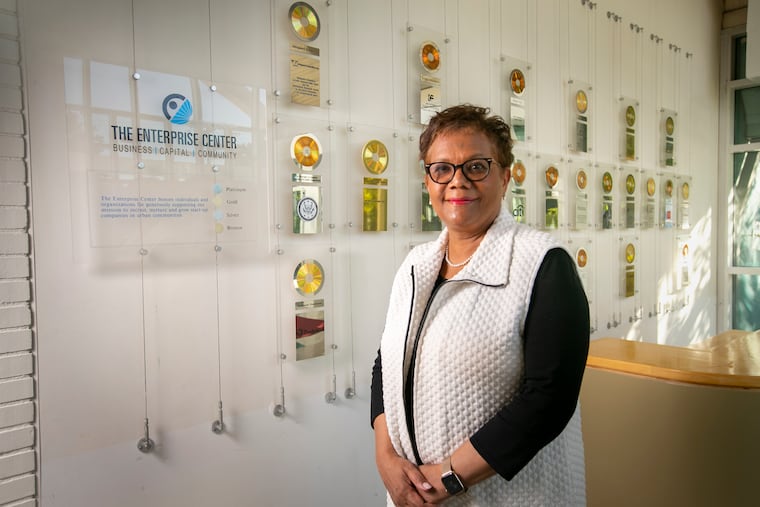A new $500K loan fund wants to help small-businesses owners of color in Philly buy their own building
The Enterprise Center’s Due Diligence Revolving Advance Pool aims to cover such upfront costs as property appraisals and legal fees.

The Enterprise Center has launched a loan pool designed to help businesses of color that lack sufficient assets for traditional loans to purchase property.
That’s good news for Trina Worrell-Benjamin, who owns TWB Cleaning Contractors, a commercial cleaning company she founded in 2014.
“That pool of money will definitely be a game changer, not only for businesses like myself,” Worrell-Benjamin said, “but other small minority businesses that will have the opportunity to access those funds.”
Called the Due Diligence Revolving Advance Pool, the $500,000 fund aims to cover such upfront costs as property appraisals, closing costs, background checks, legal fees, and earnings reports for minority business enterprises. The pool will pay up to 75% of a business’s closing and due diligence costs.
Recipients are expected to pay back the advance once the deal closes. If not, the loan accrues annual interest at 3.5%, and business owners have three years to pay it off.
Della Clark has led the Enterprise Center, an assistance agency for high-potential entrepreneurs of color, for more than three decades. She said the new loan pool is designed to address both traditional business barriers and newer challenges such as inflation and high interest rates.
In Philadelphia, most Black people and other people of color come from what Clark called low-wealth communities compared with white business owners. Immediately, a gap emerges.
“When they start out, they don’t have cash reserves,” Clark said. “They don’t have assets for collateralization overall, but what they do have is aspirations and dreams to have a business.”
Businesses that don’t have cash for upfront costs are less likely to own their own brick-and-mortar locations, which can make it harder to access loans for upgrades or expansion.
Worrell-Benjamin has never received a loan from a bank “because I’ve experienced challenges,” she said. Instead, she borrows from a community development financial institution, or CDFI .
For the last year and a half, Worrell-Benjamin has been searching for a warehouse space for her business. TWB employs 42 people and owns eight vehicles, including a dump truck. Right now, her business rents three separate spaces: an office space, a garage space, and a place to park her vehicles. Purchasing her own commercial space would create “a one-stop shop” she said, where “everything is under one facility.”
Clark hopes that, in addition to supporting small businesses of color, the loan pool will encourage entrepreneurs to purchase property on Philadelphia’s business corridors.
To qualify for the advance loan, businesses must be for-profit, majority owned by people of color, have $500,000 in recurring revenue over a 12-month period, employ at least two full-time staffers for more than six months, and have a demonstrated investor pipeline or alternative lending source.
Clark hopes the fund will help businesses of color build assets and even help decrease crime.
“A lot of crime in this city is because people don’t have jobs, don’t have the resources to have their own business,” Clark said. “So instead of stealing cars, maybe we can help these young men open up a carwash.”